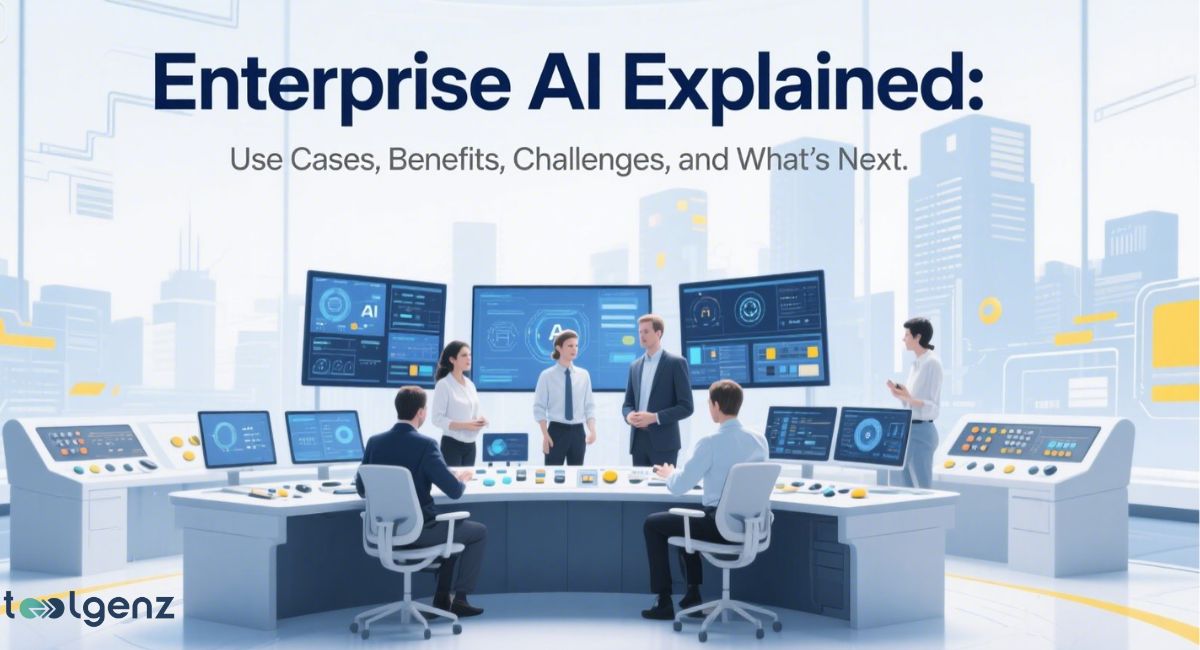Enterprise AI is changing how large companies operate, make decisions, and compete. By using AI-powered automation, machine learning in enterprises, and intelligent automation, organizations can improve everything from customer service to supply chain management.
This powerful technology helps businesses make smarter choices, faster—using real-time data and advanced analytics.
As AI integration in enterprises continues to grow, companies are seeing major changes in how they handle daily operations and long-term strategy. From business process optimization to AI-driven innovation, the impact is wide and deep.
In this guide, we’ll explain what enterprise AI is, explore real-world use cases, highlight the benefits, and break down the key challenges and future trends.
Whether you’re just starting with AI or looking to scale existing solutions, this article offers practical insights tailored to large-scale organizations. Get ready to unlock the full potential of enterprise AI.
What Is Enterprise AI and Why It Matters
Enterprise AI means using AI-powered automation and tools across the whole organization. It’s not just for one task or app. It’s a full approach where AI helps improve everything from customer service to supply chains.
These tools use machine learning in enterprises, natural language processing, and even generative AI applications like artificial general intelligence to handle large and complex data.
This kind of AI is critical for digital transformation with AI. It helps companies work faster, save costs, and make fewer mistakes. Most importantly, it turns huge amounts of data into smart, useful insights.
That’s why enterprise AI is no longer optional. It’s a must-have for large businesses.
As enterprise-scale AI platforms evolve, they offer better performance, flexibility, and scalability than ever before. Businesses that adopt these systems early can gain a serious edge over slower-moving competitors.
What Is Enterprise Scale and How AI Meets It
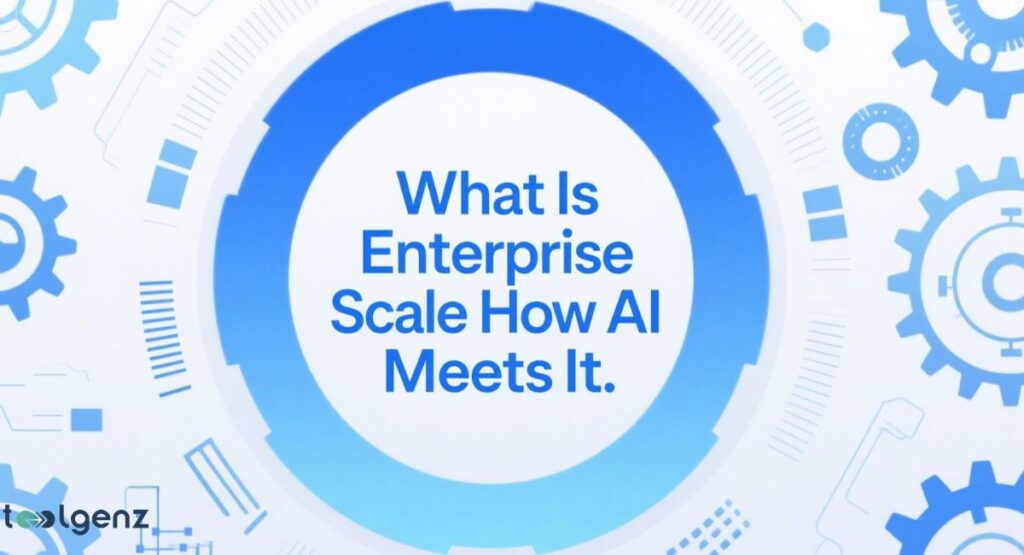
Enterprise-scale AI platforms must handle huge data, many users, and complex systems. They must also be secure and follow rules like AI governance and compliance. In short, enterprise AI is built for performance, safety, and flexibility.
To meet this scale, AI needs the right setup. This includes cloud AI services, strong servers, and support for different departments.
These systems must run smoothly, manage millions of data points, and provide quick responses to help in AI-enabled decision-making.
As businesses grow, AI scalability becomes even more important. Companies must ensure their AI systems can expand easily and continue working effectively across new tools, markets, and demands.
Enterprise AI in Practice: Real-World Applications
Enterprise AI is transforming nearly every industry. In supply chain management, it helps forecast demand and minimize disruptions. Marketers use it to craft tailored experiences that resonate with individual customers.
Banks rely on AI to detect fraudulent activity in real time, while healthcare providers are leveraging advanced data analysis to spot illnesses earlier and improve patient care.
These are just a few of many ways AI helps. In finance and accounting, AI can streamline reporting and automate routine audits. Retailers are using smart recommendation engines to match customers with products they’re more likely to love.
And when it comes to support, AI-powered chatbots are handling inquiries around the clock—improving response times while cutting operational costs.
Across all sectors, intelligent AI solutions are boosting efficiency, enhancing precision, and driving better business outcomes. From logistics to legal, AI is transforming how departments operate and make decisions.
Examples of Success with Enterprise AI Solutions
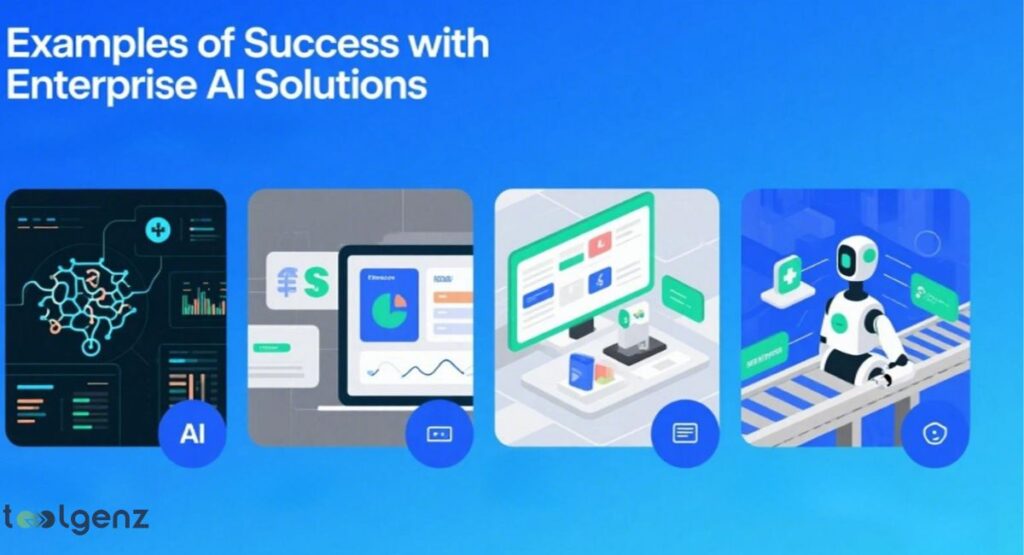
Many big companies have seen great success with enterprise AI tools and solutions. Here’s a table with a few key examples:
| Company | Use Case | Results |
| Walmart | AI in supply chain management | Faster delivery, lower costs |
| JPMorgan | AI for fraud detection | Billions saved in losses |
| Coca-Cola | AI for personalized marketing | Boost in customer engagement |
| GE Aviation | Predictive analytics in business | Fewer machine failures |
| Netflix | AI-enabled operations in streaming | Better content recommendations |
These examples show the power of industry-specific AI solutions. When done right, AI improves performance and saves money.
Implementing Enterprise AI: Strategies and Best Practices
Enterprise AI implementation needs a smart plan. Start with clear goals. Choose areas where AI can help the most. That could be in customer service, logistics, or security. Good AI transformation strategies begin small, then scale up.
Companies must also invest in training. Teams need to understand how to use AI tools. It’s also vital to have the right data.
Without clean and full data, even the best AI tools for organizations won’t work well. Over time, companies can grow AI from small projects to full AI integration in enterprises.
Success also depends on leadership support and cross-department collaboration. Aligning business goals with AI capabilities ensures that enterprise AI adds real value—not just automation.
Enterprise AI Starts with a New Technology Stack
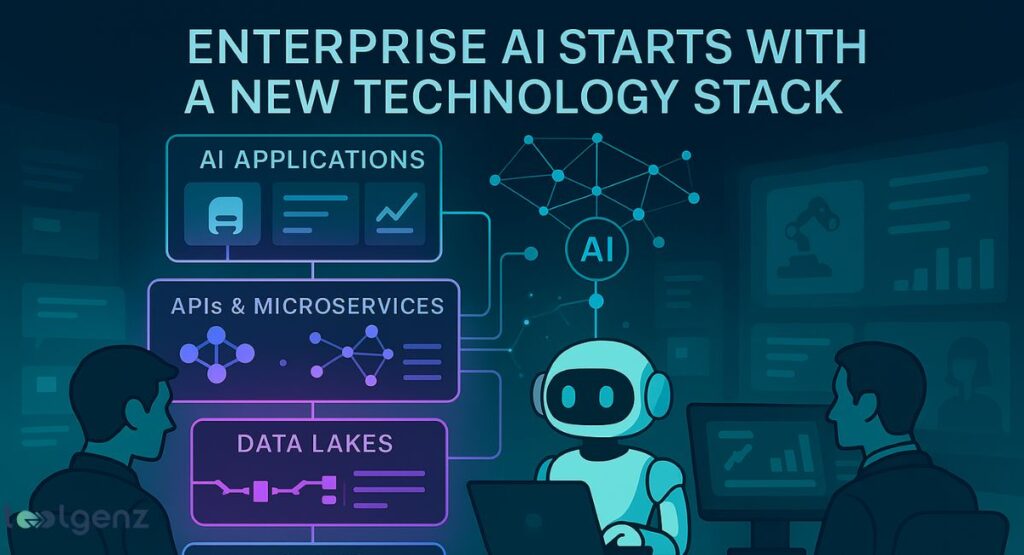
To succeed, enterprise AI needs strong tech. This includes tools for big data, fast computing, and smart models. The core of the AI technology stack for businesses includes:
| Layer | Tools & Technologies |
| Data Infrastructure | Hadoop, Snowflake, Data Lakes |
| ML/AI Frameworks | TensorFlow, PyTorch, Scikit-learn |
| Cloud AI Services | AWS AI, Microsoft Azure AI, Google AI |
| Automation Platforms | UiPath, Automation Anywhere |
| Business Intelligence | Tableau, Power BI, Qlik |
Together, these technologies support scalable AI deployment, efficient model management, and secure rollouts across departments. Building it takes time, but it gives companies a strong base.
“Do-It-Yourself” Enterprise AI vs. Turnkey Solutions
Some businesses try to build their own AI systems. Others buy ready-made platforms. Both paths have pros and cons. DIY systems give more control but need lots of time and expert staff. Turnkey systems are faster to deploy but may cost more.
The right choice depends on a company’s needs, budget, and internal skills. For some, a hybrid approach works best—starting with turnkey tools and later customizing.
Whichever route is chosen, the focus should be on long-term enterprise AI implementation that can grow and adapt with the business.
Here’s a quick table to compare:
| Feature | DIY Enterprise AI | Turnkey AI Solutions |
| Speed to Launch | Slow | Fast |
| Customization | High | Medium |
| Cost Over Time | Low | High |
| Expertise Required | Very High | Low |
| Maintenance | In-house | Vendor Supported |
Picking the right one depends on company size, goals, and tech skills.
Advantages and Risks of Enterprise AI
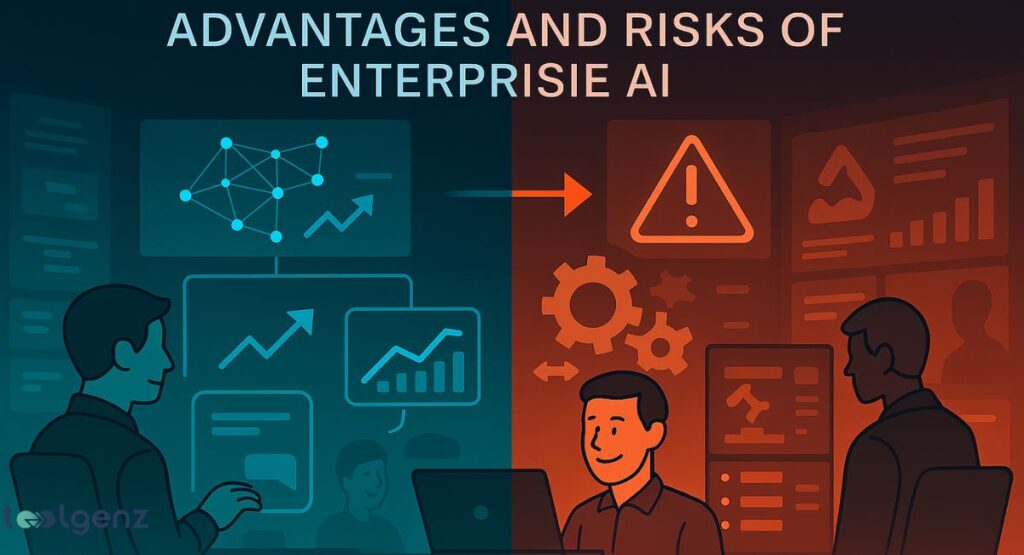
There are many benefits of enterprise AI. It boosts speed, cuts costs, and improves accuracy. AI helps people focus on big tasks while machines handle routine work.
This leads to better results and more innovation. With AI-powered analytics, companies can uncover deeper insights and make faster, more informed decisions.
But there are also risks of enterprise AI adoption. These include job loss, poor data privacy, or bias in decisions. Managing AI systems comes with its challenges. To ensure responsible use, organizations need clear ethical guidelines, strong risk controls, and a commitment to compliance.
Balancing these advantages and risks is key. Success with enterprise AI depends on careful planning, transparent practices, and choosing the right enterprise AI tools and solutions that align with company goals and values.
The Future of Enterprise AI: Trends to Watch
The future of enterprise AI looks exciting. One big trend is generative AI applications like ChatGPT and image creation tools. These are moving from labs into real business use. Another is intelligent automation where AI and robots work together.
Also, AI is becoming more trusted in big decisions. AI is rapidly gaining ground in cybersecurity, big data analytics, and nearly every major business sector, accelerating transformation across the board.
Soon, most business tools will have some form of AI-enabled operations built in.
To stay ahead, companies must explore emerging technologies, invest in AI model management, and track innovations in enterprise-scale AI platforms. The businesses that adapt early will lead the next wave of AI-powered transformation.
Enterprise AI Buyer’s Guide and Resources
If you’re ready to invest in enterprise AI, here’s how to start. First, define your goals. Then, pick the right tools. Look for platforms that offer:
- Strong support for AI for decision-making at scale
- Easy data integration
- Flexible deployment (cloud, hybrid, on-premise)
- Proven enterprise AI challenges and solutions
- Security and compliance tools built-in
Some of the best enterprise AI platforms today include:
| Platform | Best For |
| AWS AI | Cloud-based tools and models |
| Microsoft Azure | Easy integration with business software |
| Google Cloud AI | Powerful ML models and data tools |
| IBM Watson | AI for large-scale organizations |
| DataRobot | Fast, automated model building |
You can also check official sites, webinars, whitepapers, and analyst reports to make informed choices.
Conclusion
In conclusion, enterprise AI is a game-changer for large businesses in the USA. It helps turn data into action, brings faster growth, and solves complex problems.
But success needs the right tools, smart planning, and good governance. As AI keeps growing, it’s time for every business to ask: How can we make the most of this powerful tool?
Whether you’re just starting or scaling up, the future belongs to those who embrace AI integration in enterprises with confidence and care.
The journey ahead will involve continuous learning, strong AI governance, and strategic investment in enterprise AI tools and solutions.
With the right roadmap, businesses can unlock the full value of AI-enabled decision-making and lead the way in the digital age.
FAQs
1. What is enterprise artificial intelligence?
Enterprise AI is the use of advanced AI technologies across an entire organization to improve operations, decision-making, and business outcomes.
2. What does the C3 AI company do?
C3 AI provides enterprise AI software that helps businesses build, deploy, and manage AI applications at scale.
3. What is artificial intelligence in simple words?
Artificial intelligence is when machines or software can think, learn, or make decisions like humans.
4. What is an intelligent enterprise?
An intelligent enterprise uses technologies like AI, analytics, and automation to run smarter and make better decisions.
5. What is the difference between AI and enterprise AI?
AI is the general concept of machines doing smart tasks, while enterprise AI applies this concept across large businesses to solve real-world problems.


